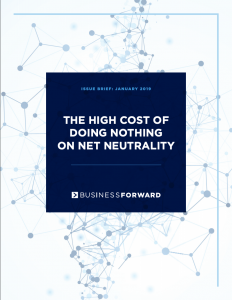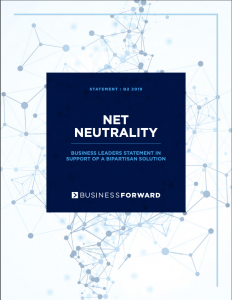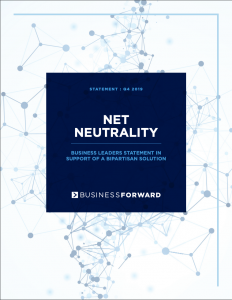Technology
We’re focused on five issues that will help determine how new technologies grow and shape our economy.
Business Forward has organized hundreds of briefings across the country on technology and innovation, collecting recommendations from local business leaders on a range of issues, from how to protect IP to helping small businesses use the internet to find new markets. These five issues stand out.
Net neutrality. The best way to ensure an open and vital internet is to prevent network operators from interfering with traffic to favor data from some sites or applications over others. With net neutrality, companies operating at the “edge” of the network are more likely to invest in distance learning, telemedicine, media streaming, and other new, data-intensive businesses.
Broadband access. Broadband access is critical to economic opportunity. In fact, gaining access to broadband correlates with a $2,100 per year boost to household income, and each 1% increase in a state’s broadband penetration increases employment by up to 0.3% per year. More than 19 million Americans living in rural areas lack broadband access. And, pockets of inner-cities are being left behind. Our businesses, schools and libraries need access to broadband wherever they are in order to compete.
Data privacy. The collection and use of data has powered our digital economy and America’s continued leadership in technology. As data collection grows, new policies and standards must promote appropriate uses of data that enable innovative, low-cost services without violating consumer privacy.
Cybersecurity. Too often, small businesses are targeted with viruses, ransomware or scams. Policymakers and law enforcers should make protecting small businesses from hackers, international crooks and identity thieves a priority.
Tools for Small Businesses. Small business owners are using online tools to reach new markets, recruit talent, and lower their operating costs. Many big tech companies are helping. But businesses operating in small towns face additional challenges, and the best way to address them is to build scale through partnerships with neighboring businesses, universities, incubators, and local governments.
Reports
Media

Briefing: Broadband maps and the Broadband Equity, Access, and Deployment (BEAD) Program
Government Innovation, Technology

U.S. Department of Education on the Digital Divide
Education, Future of Work, ...

Public Policy Changes Small and Mid-Sized Businesses Should Know About
Small Business, Technology

Briefing: National Institute of Standards and Technology (NIST) on the Bipartisan Innovation Act
Access to Capital, Diversity & Inclusion, ...

Briefing: The Digital Divide, KUB Project, and the American Jobs Plan
Technology

Briefing: John Bailey on Closing the Homework Gap during Covid-19
Education, Technology

Briefing: Mobilizing Technology for a 21st Century Government with Jennifer Anastasoff
Government Innovation, Solutions 2020, ...

BRIEFING: CAMERON KERRY ON PRIVACY
Technology
News & Events

The Affordable Connectivity Program Is Working. We Can’t Allow Gridlock in Congress to Set Us Back.
Future of Work, Infrastructure, ...

STATEMENT FROM JIM DOYLE IN SUPPORT OF THE U.S. SENATE’S BIPARTISAN BORDER SECURITY BILL
Small Business, Technology

STATEMENT FROM JIM DOYLE IN SUPPORT OF THE BIDEN-HARRIS ADMINISTRATION’S CONTINUED COMMITMENT TO THE AFFORDABLE CONNECTIVITY PROGRAM
Small Business, Technology

BRIEFING: LABOR SHORTAGES
Education, Future of Work, ...

SMALL BUSINESS DIGITAL ALLIANCE CELEBRATES SIX MONTHS IN COLLABORATION WITH LOCAL ALLIES
Access to Capital, Small Business, ...

SMALL BUSINESS DIGITAL ALLIANCE PUBLISHES LIBRARY OF FREE DIGITAL TOOLS FROM NATIONAL MEMBERS, FORTUNE 500 COMPANIES AVAILABLE TO SMALL BUSINESSES
Access to Capital, Small Business, ...

WHAT THEY ARE SAYING: CORPORATE AMERICA, CHAMBERS, LOCAL SMALL BUSINESS LEADERS APPLAUD NEW SBDA DIGITAL INITIATIVE FOR ENTREPRENEURS
Access to Capital, Small Business, ...

STATEMENT FROM JIM DOYLE ON NEXT GEN 911 SERVICES
Technology

SMALL BUSINESS DIGITAL ALLIANCE ANNOUNCES NATIONAL MEMBERS AND FIRST SLATE OF EVENTS
Access to Capital, Small Business, ...

SMALL BUSINESS ADMINISTRATION AND BUSINESS FORWARD LAUNCH THE SMALL BUSINESS DIGITAL ALLIANCE
Access to Capital, Small Business, ...

BUSINESS FORWARD ON THE BIDEN ADMINISTRATION’S ONGOING EFFORT TO CLOSE THE DIGITAL DIVIDE AND ELIMINATE THE HOMEWORK GAP
Education, Future of Work, ...

STATEMENT FROM JIM DOYLE ON THE INFRASTRUCTURE INVESTMENT AND JOBS ACT
Climate & Clean Energy, Infrastructure, ...

BRIEFING: OFFICE OF THE FIRST LADY & U.S. DEPARTMENT OF EDUCATION
Education, Future of Work, ...

STATEMENT FROM JIM DOYLE APPLAUDING THE BIPARTISAN INFRASTRUCTURE DEAL
Climate & Clean Energy, Infrastructure, ...

BRIEFING: U.S. DEPARTMENT OF COMMERCE ON BROADBAND MAPS
Infrastructure, Technology

140+ BUSINESS LEADERS SIGN IN SUPPORT OF THE BIPARTISAN INFRASTRUCTURE FRAMEWORK
Climate & Clean Energy, Infrastructure, ...

BRIEFING: U.S. DEPARTMENT OF EDUCATION ON THE DIGITAL DIVIDE
Education, Future of Work, ...

BRIEFING: NATIONAL INSTITUTE OF STANDARDS AND TECHNOLOGY (NIST) ON THE BIPARTISAN INNOVATION ACT
Access to Capital, Diversity & Inclusion, ...

UPDATED REPORT ON OUR COVID-19 BROADBAND ECONOMY
Education, Future of Work, ...

SMALL BUSINESS GOES DIGITAL
Small Business, Technology

180+ BUSINESS LEADERS SIGN IN SUPPORT OF THE AMERICAN RESCUE PLAN
Access to Capital, Climate & Clean Energy, ...

UPDATED REPORT ON CLOSING THE HOMEWORK GAP
Education, Future of Work, ...

Briefing: The digital divide, KUB project, and the American Jobs Plan
Infrastructure, Technology

NEW REPORT ON THE HOMEWORK GAP
Education, Future of Work, ...

NEW REPORT ON WHAT BUSINESS LEADERS SAY ABOUT THE HOMEWORK GAP
Education, Future of Work, ...

NEW REPORT ON OUR BROADBAND ECONOMY
Technology

STATEMENT FROM JIM DOYLE REGARDING THE FCC RULING
Technology

Milwaukee 2020 virtual policy roundtables, August 17-20
Climate & Clean Energy, Diversity & Inclusion, ...

Why Coronavirus relief should include broadband investments
Education, Technology

Briefing: John Bailey on Closing the Homework Gap during Covid-19
Education, Future of Work, ...

STATEMENT FROM JIM DOYLE
Technology

Solutions 2020 Briefing: Mobilizing Tech Talent For The U.S. Government
Government Innovation, Solutions 2020, ...

STATEMENT FROM JIM DOYLE, PRESIDENT, BUSINESS FORWARD REGARDING THE HOUSE PASSING THE “SAVE THE INTERNET ACT”
Technology

STATEMENT FROM JIM DOYLE, PRESIDENT, BUSINESS FORWARD ON HOUSE SUBCOMMITTEE’S ADVANCEMENT OF NET NEUTRALITY LEGISLATION
Technology

STATEMENT FROM JIM DOYLE, PRESIDENT, BUSINESS FORWARD ON NEWLY INTRODUCED NET NEUTRALITY LEGISLATION
Technology

A Framework for Data Privacy
Technology

Business Forward Report on Net Neutrality Cites High Cost of Inaction
Technology

BRIEFING: CAMERON KERRY ON PRIVACY
Technology

CT Business Leaders Discuss Value of Internet Tools, Access with Sen. Blumenthal
Small Business, Technology









